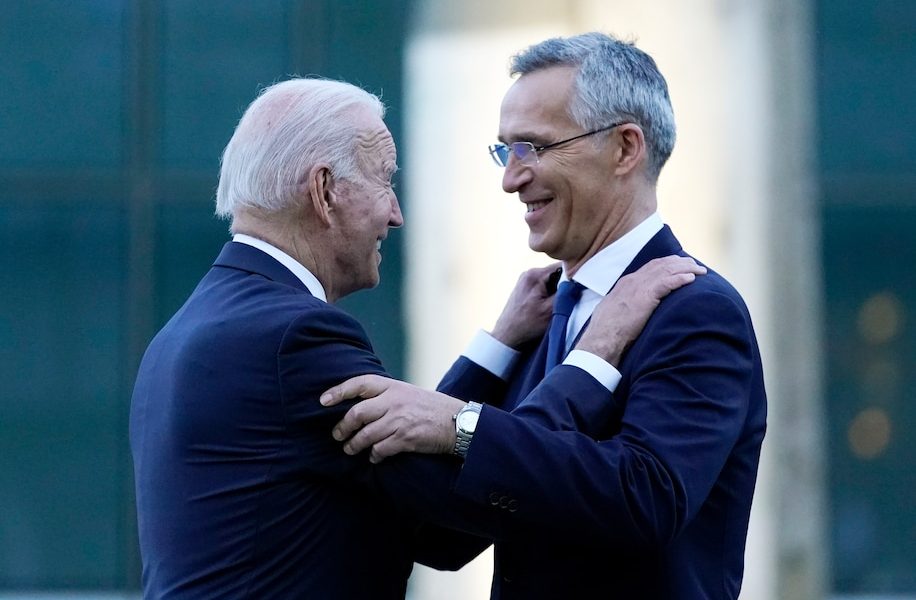Declaring “America is back,” President Biden has pledged to restore alliance ties badly battered by his predecessor. Nevertheless, his botched withdrawal from Afghanistan caused dismay in NATO capitals, and the administration’s decision to create a British, U.S. and Australian submarine program infuriated France.
But both actions pale in significance to what might occur if Biden continues to pursue a major change in U.S. nuclear deterrence policy — despite strong allied opposition — because that change would strike at the heart of transatlantic ties and would be interpreted as a huge step toward decoupling the United States from Europe’s defense. NATO defense ministers queued up to make this point unequivocally to Lloyd Austin at a recent ministerial meeting.
Since NATO’s inception, successive U.S. administrations have pledged that a Russian invasion of NATO member states would trigger a U.S. response, and that response could include using nuclear weapons. This “extended deterrence” policy is widely believed to have contributed to forestalling such an attack, even during the darkest days of the Cold War
But Biden does not share this belief. As vice president, he tried unsuccessfully to persuade President Barack Obama to change policy, and declared that “given our non-nuclear capabilities … it’s hard to envision a plausible scenario in which the first use of nuclear weapons would be necessary… [W]e can deter and defend ourselves and our allies against non-nuclear threats through other means.”
In the spring of 2020, candidate Biden doubled down: “I believe the sole purpose of the U.S. nuclear arsenal should be deterring — and, if necessary, retaliating against — a nuclear attack,” he wrote in Foreign Affairs. “As president, I will work to put that belief into practice, in consultation with the U.S. military and U.S. allies.”
That is exactly what he is now seeking to do. The Biden administration is undertaking a nuclear posture review, with the aim of implementing the president’s rash determination to change long-standing U.S. policy. And allied governments are very worried.
Despite the growth in Russian military capabilities over the past 15 years, the president’s faith in a “No First Use” policy rests on the presumption that the United States has sufficient conventional superiority that Vladimir Putin would never attempt to seize NATO territory. That presumption is flawed. It assumes that deterrence by conventional means alone can successfully forestall war (an assumption belied by centuries of European history) and that — despite two decades of U.S. disinvestment in armor, long-range weapons systems and short-range air defenses while Russia has advanced in electronic warfare and other conventional capabilities — NATO is not “outranged and outgunned” by the Russians. It also ignores geography: Russia’s superior forces along the European front line could quickly seize NATO territory before U.S. forces even arrived. Finally, and most important, it assumes that NATO governments and populations are prepared to accept victory achieved by a bloody conventional war on their territory.
Advocates of No First Use assert that its adoption would cause Moscow to similarly forswear the first use of nuclear weapons. That idea is culturally arrogant and contrary to considerable historical evidence. Russia remains committed to coercive and unambiguous nuclear first-use threats to support its expansionist agenda.
Other NATO capitals understand there is no positive benefit from a U.S. embrace of No First Use — just enormous downsides. Allied governments (including key Asian allies) have been warning the administration at all levels strenuously, bluntly and unambiguously against such a change. In response to these entreaties, the administration has retreated to a convoluted attempt at constructing an alternative policy that would declare the U.S. nuclear arsenal’s “sole purpose” is to deter nuclear attack by adversaries. The eventual formulation might be quite close to existing policy, but adopting any new variant would signal a unilateral change to the extended deterrence promise that lies at the heart of NATO policy.
Rejecting our allies’ views on a matter absolutely central to their security is dangerous. Adopting “sole purpose,” let alone No First Use, would rupture the alliance. The policies of NATO’s other nuclear powers, Britain and France, will not change even if U.S. policy does. Eastern European allies that joined NATO precisely to benefit from extended deterrence will be unnerved. NATO policy, which remains based on the threat that has forestalled aggression for seven decades, will be undercut.
Our allies are one of the United States’ comparative strategic advantages. Successful alliance management requires meaningful consultations — listening to allies’ concerns and modifying “America First” initiatives that call into question the United States’ will to defend its allies.
Putin has worked tirelessly to break NATO. It would be shameful and unforgivable if the Biden administration were to help him achieve his objective.
Originally published in The Washington Post

